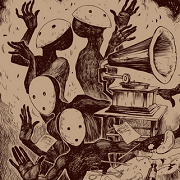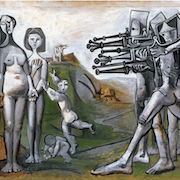|
Ardennes posted:The Soviets didn't know it was a hoax, that was the problem. Funnily enough this makes it a total success
|
|
|
|

|
| # ? May 27, 2024 00:29 |
|
indigi posted:this may be off topic, but given the outcome, are we sure the late 80s Soviet reformers were operating in good faith? mila kunis posted:Yeah I have the same question. The housing problem in the soviet economy looks pretty good in comparison with what we have to deal with in 2020 in the advanced capitalist countries. Full employment also seems pretty good, and most of the problems, while real, don't seem that bad or bad enough to cause any kind of inevitable crash that required marketization to stave it off. From the same Parenti book: Obviously lots of ordinary people are nostalgic about the socialist period in the former USSR, GDR, Yugoslavia, etc., considering capitalism is an exploitative system subject to periodic crises (and considering how capitalist restoration was associated with a blatant decline in living standards.) But the point is that socialism is supposed to be superior: capable of achieving higher productivity than capitalism, capable of more rationally allocating labor and goods compared to the anarchy of capitalist production, and so on. Yet that didn't seem to be the case in the USSR and other 20th century efforts at building socialist economies. I think the Communist Party of China is right in arguing that the most logical conclusion to draw from this is that a planned socialist economy requires a higher level of productive forces than was existed in these countries (including China), so that in the absence of said productive forces the only alternative is to tolerate some sort of market economy. One Marx quote CPC ideologists like to cite is as follows: "No social order ever perishes before all the productive forces for which there is room in it have developed; and new, higher relations of production never appear before the material conditions of their existence have matured in the womb of the old society itself." If the market still has a role to play in developing an economy's productive forces, rather than acting as a fetter on them, then the CPC argues that it is only logical to continue to make use of the market so long as planning cannot yet replace market functions. Enver Zogha has issued a correction as of 20:04 on Nov 20, 2020 |
|
|
|
Enver Zogha posted:
Iím not certain but it seems like people saying life was better under socialism is a key data point in judging whether or not socialism is superior to capitalism
|
|
|
|
indigi posted:Iím not certain but it seems like people saying life was better under socialism is a key data point in judging whether or not socialism is superior to capitalism I've communicated with people who lived in Jonestown and overall enjoyed life there despite being lorded over by a deranged cult leader. This does not mean Jonestown was a viable alternative to capitalism. For Marxists, socialism's superiority to capitalism isn't based on a subjective desire to live in a society without private property, otherwise socialism could have been built at any period of history independent of society's productive forces. Enver Zogha has issued a correction as of 20:42 on Nov 20, 2020 |
|
|
|
Enver Zogha posted:I've communicated with people who lived in Jonestown and overall enjoyed life there despite being lorded over by a deranged cult leader. This does not mean Jonestown was a viable alternative to capitalism. Lmao come off it. There's a massive difference between that and people describing real material differences in living and living standards, and also functioning worse economically. quote:Agricultural output of grain, corn, livestock, and other products plummeted in the former communist countries, as thousands of cooperative farms were forcibly broken up. The new private farmers have small plots, often cannot get loans, seeds, fe rtilizer, or machin≠ery, and are rapidly losing their holdings or reverting to subsistence farming. Hungary's agricultural cooperatives had been one sector of the socialist economy that performed well. But with privatization, farm output tumbled 40 percent in 1993 (Los Angeles Times, 1/29/94). quote:A drastic deterioration in agricultural production occurred in Bulgaria, once considered the breadbasket of Eastern Europe, caus≠ing severe bread shortages by 1996. Bulgaria was also suffering from a 20 percent monthly inflation and was sinking into that familiar cycle of foreign debt: cutting back on services to qualify for IMF loans, borrowing to pay off past borrowing. "The [Bulgarian] gov≠ernment must impose more free market austerity measures to get vital international loans to repay portions of the $9.4 billion foreign debt" (San Francisco Chronicle, 7/ 18/96). quote:Much production in East Germany was dismantled to prevent competition with We st German firms. This was especially evident when collective agriculture was broken up to protect the heavily sub≠sidized and less productive private farms of West Germany.8 Without making compensation, We st German capitalists grabbed almost all the socialized property in the GDR, including factories, mills, farms, apartments and other real estate, and the medical care system -assets worth about $2 trillion - in what has amounted to the largest expropriation of public wealth by private capital in European history. The end result of all this free-market privatization in East Germany is that rents, once 5 percent of one's income, have climbed to as much as two-thirds; likewise the costs of transportation, child care, health care, and higher education have soared beyond the reach of many. quote:In Russia, the living standard of the average family has fallen almost by half since the market "reforms" took hold (New York Times, 6116196). quote:In the emerging free-market paradise of Russia and Eastern Europe, price deregulation produced not competitive prices but prices set by private monopolies, adding to the galloping inflation. Beggars, pimps, dope pushers, and other hustlers ply their trades as never before. And there has been a dramatic rise in unemployment, homelessness, air and water pollution, prostitution, spousal abuse, child abuse, and just about every other social ill. quote:The overthrow of communism brought a rising infant mortality and soaring death rates in Russia, Bulgaria, Hungary, Latvia, Moldavia, Rumania, Ukraine, Mongolia, and East Germany. One≠third of Russian men never live to sixty years of age. In 1992, Russia's birth rate fe ll below its death rate for the first time since World War II. quote:With the end of subsidized rents, estimates of homelessness in Moscow alone run as high as 300,000. The loss of resident permits deprives the homeless of medical care and other state benefits, such as they are. Dressed in rags and victimized by both mobsters and government militia, thousands of indigents die of cold and hunger on the streets of various cities. In Rumania, thousands of homeless children live in sewers and train stations, sniffing glue to numb their hunger, begging and falling prey to various predators (National Public Radio news, 7/21/96). quote:Real income has shrunk by as much as 30 to 40 percent in the ex≠communist countries. In 1992 alone, Russia saw its consumer spend≠ing drop by 38 percent. (By comparison, during the Great Depression, consumer spending in the United States fell 21 percent over four years. ) In both Poland and Bulgaria, an estimated 70 per-- cent now live below or just above the poverty line. In Russia, it is 75 to 85 percent, with a third of the population barely subsisting in absolute economic desperation. In Hungary, which has received most of the We st's investment in Eastern Europe, over one-third of its citizens live in abject poverty, and 70 percent of the men hold two or more jobs, working up to 14 hours a day, according to the Ministry of Labor. and on and on and on. it's transparent to me that this isn't nostalgia, the prior system was superior it took total oligarch control, shelling their own parliament, jailing and assassinations, transparent vote rigging and the doing away of the pretence of democracy from yeltsin and putin that prevented the communists coming back to power in russia
|
|
|
|
The shift towards reform was overwhelmingly driven by liberal intelligentsia who envied their counterparts in the West, as mentioned above. The real problems of the Soviet Union (overuse of labor, underpricing food, powerful energy and military industrial blocs) were either caused by political compromises made with the working class (no direct taxation of individual income, but socialized through the firm) lack of key technology, or capitalist threat. Computerization and digitization are necessary components of moving beyond a Fordist model of economic growth under socialism, but they weren't there for the Soviets and were still another decade out. If you consider the sheer catastrophes the Russia/the Soviet Union faced (Russia's backward development, World War I, civil war, technological blockade, Nazi invasion, inchoate nationalisms, and military competition with US), Soviet socialism looks like a tremendous success. Political opportunists brought it down from the inside, while states that relied way more on Soviet largesse (NK, Cuba) persisted by never allowing liberals to infiltrate the highest levels of government. The 1980s were a key period of weakness for it and Gorbachev was exactly the wrong man. Would not be surprised if in 50 years we learn, oops, he was actually a West German agent all along! KaptainKrunk has issued a correction as of 22:32 on Nov 20, 2020 |
|
|
|
mila kunis posted:Lmao come off it. There's a massive difference between that and people describing real material differences in living and living standards, and also functioning worse economically. The point is that by ignoring the need for market reforms, the leaders of the CPSU unwittingly created the material conditions for political counter-revolution, which meant that when capitalist relations did return it would be in conditions where the bourgeoisie held state power. The existing socialist countries have all sought to a greater or lesser extent to embark on market reforms. Whatever one thinks of the Chinese economy, the CPC's approach toward capitalism has clearly been a lot better for ordinary people compared to how capitalist restoration went in the former USSR. The same can clearly be said for Vietnam, Laos, and Cuba (reforms in the DPRK seem to have been either very limited or stillborn, so not much room to comment there.) Enver Zogha has issued a correction as of 23:11 on Nov 20, 2020 |
|
|
|
Enver Zogha posted:Obviously lots of ordinary people are nostalgic about the socialist period in the former USSR, GDR, Yugoslavia, etc., considering capitalism is an exploitative system subject to periodic crises (and considering how capitalist restoration was associated with a blatant decline in living standards.) But the point is that socialism is supposed to be superior: capable of achieving higher productivity than capitalism, capable of more rationally allocating labor and goods compared to the anarchy of capitalist production, and so on. Yet that didn't seem to be the case in the USSR and other 20th century efforts at building socialist economies. I think the Communist Party of China is right in arguing that the most logical conclusion to draw from this is that a planned socialist economy requires a higher level of productive forces than was existed in these countries (including China), so that in the absence of said productive forces the only alternative is to tolerate some sort of market economy. Basically, according to you, unless a system can take a war-torn agricultural country and not only make it a superpower but have it completely dominate an alliance of countries with 10 times its economy, it completely failed and there is nothing to learn from it. Game over etc etc. Btw, productivity really wasn't really the Soviets' major problem it was access to capital and technology at least in "commanding height" industries. Also, in all honesty, if Deng's reforms happened co-aligned with an opening of Chinese trade, very little would have happened. You could say market reforms allowed to adjust more readily to foreign trade, but without that foreign trade in the first place, they would have gone nowhere. Also, there are aspects of contemporary China, like housing that honestly would benefit from better and more direct central planning alongside the fact that the state still have a huge hand in guiding the economy including entire swaths of the economy. Enver Zogha posted:Well again, for Marxists the superiority of an economic system is based on its ability to negate earlier modes of production. This clearly did not happen in the USSR, where not only did the law of value continue to operate (as Stalin acknowledged it did), but Soviet officialdom basically treated this law as subordinate to whatever these officials felt like doing to the economy. This cavalier attitude led to black markets and corruption. NO! Market reforms only worked when it was connected to an opening in foreign trade with the West, but it didn't magically just fix what was going on unless there was capital flowing in. China and Vietnam didn't just grow because of the magic of the market but because Western states were dumping off billions in trade on their shores. The Soviet Union collapsed because its foreign trade collapsed and its foreign trade collapsed because oil prices did. What were oil prices during the 1990s doing (they were on the floor). If anything for the Soviets central planning is a red herring compared to something like Dutch disease. Ardennes has issued a correction as of 23:32 on Nov 20, 2020 |
|
|
|
Ardennes posted:Basically, according to you, unless a system can take a war-torn agricultural country and not only make it a superpower but have it completely dominate an alliance of countries with 10 times its economy, it completely failed and there is nothing to learn from it. Game over etc etc. quote:Btw, productivity really wasn't the Soviets' major problem it was access to capital and technology at least in "commanding height" industries. quote:Also, in all honesty, if Deng's reforms happened co-aligned with an opening of Chinese trade, very little would have happened. You could say market reforms allowed to adjust more readily to foreign trade, but without that foreign trade in the first place, they would have gone nowhere. quote:Market reforms only worked when it was connected to an opening in foreign trade with the West, but it didn't magically just fix what was going on unless there was capital flowing in. quote:Also, there are aspects of contemporary China, like housing that honestly would benefit from better and more direct central planning quote:alongside the fact that the state still have a huge hand in guiding the economy including entire swaths of the economy.
|
|
|
|
i have nothing to contribute to this discussion but im enjoying it. keep arguing imo
|
|
|
|
Enver Zogha posted:Whatever one thinks of the Chinese economy, the CPC's approach toward capitalism has clearly been a lot better for ordinary people compared to how capitalist restoration went in the former USSR. uncop posted:The Chinese revisionists didnít save the people from decades of poverty, they condemned them to decades of poverty. We can only start talking about real improvement of social conditions in the 21st century, decades after the systems that kept the people from poverty had been purposefully dismantled. They hosed up a whole generation and basically blamed the social damage on the Cultural Revolution. Iím (clearly) not as familiar with the history as either of you, but Iím having a hard time squaring these posts Enver Zogha posted:Well again, for Marxists the superiority of an economic system is based on its ability to negate earlier modes of production. I thought it was about providing a more just and socially beneficial economic system? I havenít read Capital or other Big Theory books, but from what I got from various pamphlets by Engels/Marx/Lenin wasnít that communism promised to out-efficient and out-produce capitalism, rather that it would take control of the means of production in order to share its fruits more equitably. they didnít seem to spend time focusing on being superior on the ledger sheet, and in fact blamed a lot of the evils of capitalism on its ruthless pursuit of value
|
|
|
|
This
|
|
|
|
Enver Zogha posted:There's plenty to learn from the USSR and friends, both negative and positive. It is the specifics that count though. quote:Do you have a source you'd like to share? The Davies series on the Industrialization of the Soviet Union covers what was occurring during the 1920s/1930s pretty well, but most of the situation doesn't change. The Soviet Union, while it has issues with productivity, the issue is always foreign trade and that the Soviet Union simply is an a massive technological disadvantage through its existence and it has to use excess capital to import machinery to make up the difference, this is still going on in the 1980s. Post-war Soviet economic history is still a relatively new field since many sources quote:No poo poo, capitalism is an international system and the growth of modern productive forces requires foreign trade. That's why Deng treated "opening up" and domestic reform as inseparable. What's your point? That it undermines any useful comparison because you are really talking about a difference in international trade relations not a fundamental difference in political economy. Btw, Cuba has struggled for years because of its trade deficit, and liberalization more recently was to try to accrue slightly more capital from tourists. quote:You're assuming that these two things aren't naturally interrelated, as if (for example) Cuba's market reforms aren't linked to efforts at greater foreign investment. The question is if market reforms are actually more efficient in isolation, or are simply conditional. In Cuba's case, it really seems conditional based on changing tourism patterns. quote:Yes, yes it does. What's your point? A workers' state making use of market mechanisms doesn't mean embracing the outlook of Murray Rothbard. The problem is seeing market reforms as a panacea rather than completely contingent on if the West is willing to play along. Even after Russia liberalized and they were on their knees beginning for loans, the US wouldn't budge because it wanted not just the Soviet Union to die but to Russia to stay on the ground. The West, particularly, the US picks winners and losers or at least once did. quote:Iím (clearly) not as familiar with the history as either of you, but Iím having a hard time squaring these posts Eh, depends on how you frame "condemned" to poverty since hundreds of millions of former peasants moved to cities and clearly had an improved quality of life. Ardennes has issued a correction as of 01:10 on Nov 21, 2020 |
|
|
|
indigi posted:I thought it was about providing a more just and socially beneficial economic system? I havenít read Capital or other Big Theory books, but from what I got from various pamphlets by Engels/Marx/Lenin wasnít that communism promised to out-efficient and out-produce capitalism, rather that it would take control of the means of production in order to share its fruits more equitably. they didnít seem to spend time focusing on being superior on the ledger sheet, and in fact blamed a lot of the evils of capitalism on its ruthless pursuit of value I recently wrote a whole article on the subject, contrasting how Marx and Engels viewed capitalism compared to how utopian socialists viewed it: https://jonestown.sdsu.edu/?page_id=102313 They absolutely did argue that communism would be more productive than capitalism, e.g. Marx writing in his critique of the Gotha Programme that only after "all the springs of co-operative wealth flow more abundantly. . . can the narrow horizon of bourgeois right be crossed in its entirety and society inscribe on its banners: From each according to his ability, to each according to his needs!" Not only that but capitalism's ever-increasing productivity leads it into ever more severe economic crises which can only be resolved by socializing the means of production, since at that point capitalism becomes a fetter on the productive forces. Ardennes posted:The Davies series on the Industrialization of the Soviet Union covers what was occurring during the 1920s/1930s pretty well, but most of the situation doesn't change. The Soviet Union, while it has issues with productivity, the issue is always foreign trade and that the Soviet Union simply is an a massive technological disadvantage through its existence and it has to use excess capital to import machinery to make up the difference, this is still going on in the 1980s. quote:Btw, Cuba has struggled for years because of its trade deficit, and liberalization more recently was to try to accrue slightly more capital from tourists. The question is if market reforms are actually more efficient in isolation, or are simply conditional. In Cuba's case, it really seems conditional based on changing tourism patterns. quote:The problem is seeing market reforms as a panacea quote:rather than completely contingent on if the West is willing to play along. quote:As recently as December 1986, when the Vietnamese Constitution was amended to guarantee the rights of private property, the public sector still dominated the economy. The rapid change that swept Vietnam in the ensuing three years was described by The Wall Street Journal last May as "almost revolutionary, particularly in the way they have opened the country to the outside world."
|
|
|
|
Enver Zogha posted:Obviously Marx, Engels, and Lenin criticized capitalism, but they did so with the knowledge that capitalism represented a historical advance compared to slavery and feudalism and was laying the foundations for its own destruction. As Engels put it, "Only at a certain level of development of the productive forces of society, an even very high level for our modern conditions, does it become possible to raise production to such an extent that the abolition of class distinctions can be a real progress, can be lasting without bringing about stagnation or even decline in the mode of social production." at what point does a society become able to fully abandon this market poo poo? didnít they think Germany was there in the 19th century? is China really that far behind?
|
|
|
|
Enver Zogha posted:Yeah but I'm not talking about the 1920s-30s, I'm talking about the 1950s-80s. This is important because the Stalin era was concerned primarily with "extensive" development (building enterprises or even entire new industries), whereas his successors were increasingly tasked with "intensive" development (improving the efficiency of the existing enterprises.) This is why productivity became such a big deal by the time Gorby came to power, whereas under Stalin it was more like "okay yes we're wasting tons of materials and whatnot, but that's secondary to building up enough of an industrial base to defeat an imperialist invasion and lay the basis for a higher standard of living later on.") The Soviet Union's central issue was still capital access after the 1950s and market reforms weren't going to change that. Productivity on its own isn't going to change if you don't have the capital resources to utilize it. quote:I never suggested market reforms "in isolation" though. My point is that Soviet-style economies have all been obliged to pursue market reforms to a greater or lesser extent, precisely under pressure from international changes combined with the limitations of their own productive forces. How they pursue these reforms is up to them. There's no single "market reform." And why didn't the Kosygin reforms, were allowed time to mature, achieve nothing? If you wanted to get rid of price controls entirely btw, you have to accept that the cost of living is going to actually decrease for workers and it is unclear how much that will matter if you don't have trade access. quote:Which I never did. Perestroika was certainly a case of market reforms, yet those resulted in disaster. The New Economic Mechanism in Hungary made that country the most market-oriented in the Warsaw Pact (at least till Gorby came along anyway), yet by the end of the 80s it was acknowledged that the NEM had failed. Yugoslavia had market reforms as part of its system of workers' self-management, but again these ended up being a pretty big disappointment by the mid-80s. So why did Perestroika and the other reforms fail in your mind? quote:I wouldn't say "completely contingent," although it obviously varies depending on the country. To give an example contrary to your view, Vietnamese reforms in the late 80s turned it from a country that imported rice to a country that exported it. A 1990 New York Times op-ed described it as an economic miracle: It says it right there "that Vietnam was opening to the outside world" and it was by 1990, a big portion of the Doi Moi reforms was about currency devaluation and opening trade access so Vietnam could sell rice exports cheaply to non-US foreign markets (Vietnam was also doing a positive trade with socialist states during this period). This isn't something that would be possible for the Soviet Union, not only did the US have a very controlled trade with the Soviets they made sure that any state remotely reliant on them traded with the Soviets as little as possible. It isn't a conspiracy, it was the Cold War.
|
|
|
|
Ardennes posted:The Soviet Union's central issue was still capital access after the 1950s and market reforms weren't going to change that. Productivity on its own isn't going to change if you don't have the capital resources to utilize it. quote:And why didn't the Kosygin reforms, were allowed time to mature, achieve nothing? quote:To quote one author (Vladimir Kontorovich, "Lessons of the 1965 Soviet Economic Reform"), quote:So why did Perestroika and the other reforms fail in your mind? The same author also gives an idea of how chaotic everything seemed: "In October and November 1989, for example, it appeared as if Leonid Abalkin would push through a radical reform package, including the full adoption of private property and free market prices. Abalkinís program, however, was defeated in December 1989 by the more cautious program of Nikolai Ryzhkov. Then again in March 1990 it seemed that Ryzhkov would be removed from power and that radical economic reforms would be instituted at the urging of Abalkin and Gorbachevís personal economic advisor Nikolai Petrakov. Even in early April 1990 Soviet officials were arguing that there was a good chance they would institute radical economic reforms similar to the program instituted in Poland as of 1 January 1990. But by the end of April 1990 market reforms were postponed indefinitely. And, then, in August and September 1990, it was reported that Gorbachev had finally decided decisively for radical market reforms with the adoption of the Shatalin Ď500-Dayí plan. However, as with all the other reform packages the 500-day plan was rejected in favor of a Gorbachev compromise program with the old Soviet institutions of economic management which basically amounted to no reform at all." (p. 41) A lot of Perestroika's problems were due to inept or vague policies, e.g. enterprises were told to find suppliers rather than rely on planners allocating resources to them as hitherto, yet enterprise managers had no idea how to go about doing that. The founders of urban cooperatives (which in many cases simply acted as private businesses) lived in fear that their ventures could be abruptly terminated by the state at any moment. There were cases where it wasn't quite clear whether a particular transaction was illegal, etc. quote:It says it right there "that Vietnam was opening to the outside world" and it was by 1990, a big portion of the Doi Moi reforms was about currency devaluation and opening trade access so Vietnam could sell rice exports cheaply to non-US foreign markets (Vietnam was also doing a positive trade with socialist states during this period). This isn't something that would be possible for the Soviet Union, not only did the US have a very controlled trade with the Soviets they made sure that any state remotely reliant on them traded with the Soviets as little as possible. It isn't a conspiracy, it was the Cold War. And I repeat, Vietnam in 1989-90 was under a US embargo. Japan (as the op-ed notes) was also vetoing Vietnam from receiving any World Bank or IMF funding. The point is that something as simple as allowing farmers to sell rice at market prices helped increase production enough to export rice and get rid of the problem of peasants hoarding their products. This does not mean Vietnam thereby solved every economic problem it faced. It does not mean "allow farmers to sell [product] at market price" is automatically great idea for every other country on the planet at any given moment in time. It also does not mean that Vietnam could somehow do away with international trade (I don't know why you keep bringing this up.) But it does show that non-cooperation from the US and international financial institutions doesn't have to mean that any and all market reforms are automatically doomed to fail. You'll notice I haven't been suggesting specifically what the Soviets "should" have done in the 1950s-80s, because I honestly don't know. It just seems fairly obvious to me that if every other single socialist country has been obliged to pursue some kind of market reforms, and if the USSR suffered from similar problems of productivity as these countries did, then it isn't magically exempt from the need for reforms just because the US didn't want other Western countries to give the Soviets access to newer technologies or whatever. How those reforms should look and when they should have been implemented is a different matter. indigi posted:at what point does a society become able to fully abandon this market poo poo? didnít they think Germany was there in the 19th century? is China really that far behind? Enver Zogha has issued a correction as of 04:04 on Nov 21, 2020 |
|
|
|
Enver Zogha posted:You haven't actually given me a source on how the USSR's "central issue was still capital access after the 1950s." Not that I'm dismissing it, but I'd like to know why you say this. In my opinion the go to monograph on Soviet trade after 1945 is yet to be written, you can read Red Globalization, but it mostly covers the global south. Nevertheless, you only have to compare Soviet currency reserves and global oil prices between 1970 and 1992 to see what was occurring. As oil rose (then fell) so did Soviet reserves. There is a reason why Soviet-West trade peaked in 1980, it was the heart of the second crisis. It is also why arguments primarily bout market reforms are missing the point, the issue the Soviets was facing was a combination of international isolation and dutch disease (ie oil production was sapping investment from other industries). It is can happen to both socialist and non-socialist states. quote:I'll quote a post I made last year: Thats the thing, the results were largely ambiguous and mostly came from robbing peter to pay paul. The industries that did well under reforms were also the industries that were most heavily subsidized and that is the key issue, achievements in productivity just were likely to be fairly minimal unless additional capital was added and the question was where to get this capital from (turned out to be oil sales to the West...). quote:Well, limiting myself to Perestroika since your posts are focused on the USSR, a major reason was due to being internally incoherent; reforms were often delayed for political reasons. To quote a bourgeois economist, "Initially, price reform was to come in 1989, then 1990, and finally it was postponed with the disclaimer that the Soviet people would rather wait on line than pay higher prices. Every time Gorbachev debated freeing up prices there was a run on the state run stores. This just exacerbated the shortage problem already plaguing the Soviet system. Shortages of everything at the state stores became the common condition. So Gorbachev promised to bring relief through subsidized basic products and the whole process of reform was stalled." (Peter J. Boettke, Why Perestroika Failed, 1993, p. 40) I would say eradicating price controls was always going to be politically unviable without increasing wages and simply something had to give. Individual rightfully hoarded products if their purchasing power was going to radically decrease and essentially Gorbachev was trying to fix the Soviet's supply issue with depressing demand and we saw in 1992 what occured with the complete end of price controls and it wasn't pretty. Basically, Gorbachev was worrying about the wrong problem, lifting price controls when the real issue was capital and that any capital raised with higher prices was going to be short term since it was literally dependent on actively starving the Soviet population. quote:Again, I already explained that market reforms are going to be interrelated with international trade, and I obviously wasn't suggesting that the USSR copy Vietnam. The issue is seeing how a small time reform (village markets) made sense in the context of international trade, and for the Soviet Union to reform it needed to do something to get around the constraints placed on it. Also, agriculture itself is a different ballgame and Soviet agriculture in particular is something that should have been broken up to a much greater extent than it did. However, agriculture is different than housing, oil/energy and heavy industry. quote:You'll notice I haven't been suggesting specifically what the Soviets "should" have done in the 1950s-80s, because I honestly don't know. It just seems fairly obvious to me that if every other single socialist country has been obliged to pursue some kind of market reforms, and if the USSR suffered from similar problems of productivity as these countries did, then it isn't magically exempt from the need for reforms just because the US didn't want other Western countries to give the Soviets access to newer technologies or whatever. How those reforms should look and when they should have been implemented is a different matter. The problem is "market reform" is a very broad concept and there is a vast difference between allowing some village markets to help increase the rice supply versus ending an economic system dependent on price controls. Also, I would say specifically the USSR was a special case because of its negative relationship with the US and that the success of certain market reforms in Vietnam/China during the 1980s simply wouldn't and couldn't work. If Vietnam, for example, implemented a "500 day style" plan while being under the same trade constrains as the USSR...it probably wouldn't have worked. If you want to say "well the Soviets could have allowed some private business here and there, broke up some state farms, maybe offered some more bonuses" etc etc fine, but it is pretty different than what Gorbachev's advisors were trying to get him to do or even PRC system reforms.
|
|
|
|
Ardennes posted:The problem is "market reform" is a very broad concept and there is a vast difference between allowing some village markets to help increase the rice supply versus ending an economic system dependent on price controls. Also, I would say specifically the USSR was a special case because of its negative relationship with the US and that the success of certain market reforms in Vietnam/China during the 1980s simply wouldn't and couldn't work. If Vietnam, for example, implemented a "500 day style" plan while being under the same trade constrains as the USSR...it probably wouldn't have worked. quote:If you want to say "well the Soviets could have allowed some private business here and there, broke up some state farms, maybe offered some more bonuses" etc etc fine, but it is pretty different than what Gorbachev's advisors were trying to get him to do or even PRC system reforms. It should be noted though that proposing "some private business here and there" was practically unspeakable until the Gorby years. Even in foreign affairs Soviet leaders looked with suspicion at the New Economic Mechanism in Hungary and had the GDR get rid of the joint private-state enterprises that Ulbricht had maintained: "In his memoirs, the former head of the LDPD, Manfred Gerlach, notes that in January 1972 Honecker informed the bloc party chairmen that the impetus for the nationalizations came from Moscow, which, while understanding the peculiarities of the GDR, saw in these enterprises a preservation of capitalism 'that could become a danger for the system.' . . . Honecker sent Brezhnev a letter thanking him for his interest in the GDR and including an extended report on the nationalization campaign." (Kopstein, The Politics of Economic Decline in East Germany, 1997, p. 79) IMO the USSR seemed pretty screwed no matter what it did. Even beyond its borders you had growing political and economic problems in Eastern Europe which culminated in the "Fall of Communism" there and dissolution of the Warsaw Pact, which I can only see the Soviets delaying rather than preventing. The "Fall of Communism" in turn would have encouraged nationalism and anti-communism inside the Soviet Union. The USSR existing in 2020 isn't impossible, but I can't see its economy turning out great and it'd probably have to make political concessions like agreeing to the secession of the Baltics, and/or "de-ideologizing" its foreign policy like China did. Enver Zogha has issued a correction as of 20:09 on Nov 21, 2020 |
|
|
|
THS posted:i have nothing to contribute to this discussion but im enjoying it. keep arguing imo 
|
|
|
|
I just to add a point to Deng's economic reform. Not enough attention is paid to Deng's gradual, experimental style of the economic reform. A lot of times, especially in early era, Deng's people fenced off a province or smaller region to do agricultural policy or pricing policy reform experiments. If the policy worked, it got slowly roll out to the rest of the country; if it didn't work, the new policy got called off. The CCP was very serious about containing the reform in a small box and didn't let their "new social problems" spread to the rest of the country. For example in the early stage of Shenzhen EEZ, the population was controlled with a very strict form of Hukou++ system. It's easy to get a travel pass to visit HK now than it was to get a pass to go inside SZ 20 years ago. This restriction was only relaxed around 04. In a way, China was governed by "One Country, many systems", sepcially in the Deng era. Things like the getting assigned free socialist apartments from you work took a very very long time and different paths to transform to the commercially purchased apartments. I happen to think this style of economy reform from one system to another system (based on a completely different ideology) is a good idea and has a lot of scientific merit. Other non communist countries can learn from it.
|
|
|
|
Enver Zogha posted:Well again, for Marxists the superiority of an economic system is based on its ability to negate earlier modes of production. This clearly did not happen in the USSR, where not only did the law of value continue to operate (as Stalin acknowledged it did), but Soviet officialdom basically treated this law as subordinate to whatever these officials felt like doing to the economy. This cavalier attitude led to black markets and corruption. You seem to have danced around the rest of my post, where market reforms were an absolute disaster that destroyed the lives of millions in the soviet bloc. The USSR had a superior economy and was a better place to live in than Russia. Deng's liberalization was the right call because china was at a far worse material base than the USSR, China had reached an accord with the west, and western capital was eager and willing to betray its own working class and find cheap labor cost havens to offshore to. Right place, right time and a zero sum game where the benefits accrued from capital investment flooding in comes at the expense of the working class from the capital rich countries. There's nothing inherently good about market reforms. It's not 'the market' that gives you benefits, its capital investment and technical knowhow which you get by bending to the demands of the richest countries in the world which have had centuries, and imperial plunder, to build that up back home. Market reforms/privatization blew up and destroyed the USSR because it was a geopolitical rival to the USA and western capital was not allowed to invest in it like it was in the PRC. The technical and economic base was far ahead of the PRC at the time, they had no immediate pressure to bend to the west but the drop in revenue from the oil price drop was seized on by the right to wreck the country. It's also wrecked several countries in latin america and the developing world. You can only get away with it if you have the ability to stop capital flight and the IMF from loan sharking your country into oblivion. mila kunis has issued a correction as of 02:45 on Nov 22, 2020 |
|
|
|
mila kunis posted:You seem to have danced around the rest of my post, where market reforms were an absolute disaster that destroyed the lives of millions in the soviet bloc. The USSR had a superior economy and was a better place to live in than Russia. The question isn't whether the USSR was economically superior to modern Russia (I certainly never claimed it wasn't), it's whether the USSR was capable of catching up to and outpacing the United States and other major capitalist countries in terms of productivity without ever needing to recourse to market reforms at some point. I'd argue the answer is no. It seems to me that the USSR's productive forces were too low relative to the level of socialization it had, therefore sooner or later the Soviets were going to have to pursue some sort of reforms aimed at expanding the role of the market. quote:There's nothing inherently good about market reforms. quote:It's not 'the market' that gives you benefits, its capital investment and technical knowhow which you get by bending to the demands of the richest countries in the world which have had centuries, and imperial plunder, to build that up back home. Cuba's experience with private hair salons, restaurants, mechanics, etc. seems to be pretty good, and as far as I know Western capital isn't investing trillions of dollars in Cuban auto repair shops or whatever. The economic gains caused by Vietnam's reforms of the late 80s weren't premised on Western companies handing over the latest and greatest in agricultural technology to rice farmers. quote:Market reforms/privatization blew up and destroyed the USSR Enver Zogha has issued a correction as of 05:55 on Nov 22, 2020 |
|
|
|
As long as we're talking about market reforms in communist countries, does anyone have any good sources for North Korea's economic reform since Kim Jong Un took power? It's been characterized as shockingly advanced given how poor the country is and I'd like to learn more.
|
|
|
|
The USSR was never going to outpace the United States so long as the US had two and a half continents from which to absorb imperial rent. What we can be very sure of is that the USSR would have had much higher GDP per capita than the sum of its constituent parts have now under capitalism, even at the "anemic" growth rate of 1-2% per year.
|
|
|
|
Enver Zogha posted:I "danced around" it because I wasn't objecting to it. What happened in the 90s was a political and economic counter-revolution. You might as well have said "oh you like market reforms huh, well HOW ABOUT WHEN PINOCHET OVERTHREW ALLENDE AND THE CHICAGO BOYS PROCEEDED TO...." I am just going to skip to this post, but I think the issue is beating around the bush here on market reforms and what they mean. Personally, I think the Soviets could have opened some small businesses and it probably would have been fine, but I think we all agree it would not have affected their trajectory. But the survival of regimes in Vietnam and Cuba largely were down to them eeking out enough capital from the West (not necessarily the US) to keep the lights on. A lot of those Cuban small businesses really do rely on tourism to keep the money flowing in and also Cuba still gets a sizable amount of remittances from the US. During the 1990s, things were honestly pretty rough for them and they were able to just pull it out, but to this day, major state enterprises (tobacco/rum/nickel etc) are still there and bringing in cash to the state and are the core of the Cuban economy. Honestly, the Soviet experience would probably even more minor than the Cubans since remittances and tourism weren't significant factors, and at best small businesses could capture some latent capital from the population but thats about it. Also, Cuba very much still has price controls. Also, the Vietnam example is more complex than presented, a big factor in the success of Doi Moi was that Vietnam was wrapping up its costly occupation of Cambodia and bringing tens of thousands of troops home. This allowed them to finally re-allocate resources from the military to the civilian economy and also started gaining trade access, it is more complex than simply market reforms. That said, I think Perestroika is where the big divergence here is, Perestroika's failure really didn't affect the trajectory of the Soviet Union. Go look at international oil prices of the period again, and come back. The Soviet Union wasn't going to able to survive after its most price efficient export to the West collapsed for over 15 years. The Soviet economy from the early 1970s had been heavily investing in oil and natural gas and when international prices tanked, what could they do? Market reforms aren't magic, they were going to spontaneously generate the revenue that was going to keep the country going when they themselves didn't have capital to reinvestment. Even if they had started years earlier it wasn't going to affect the chief outcome since the Soviet Union's decency on rents from oil exports would have gone back as long. Also, even if the Soviet Union had a crystal ball, they would have probably figured out they were screwed since they needed revenue from oil and gas. (Also, even despite trade restrictions, the Soviets probably couldn't pull a Vietnam/China since Soviet labor costs because their wages were simply going to be higher.) Also, the Hungarian NEM was heavily dependent on borrowing during the 1970s, and is one of the chief reasons they had to beg for IMF loans in the early 1980s. I don't think lifting some price controls is what set them back, but at the same time, you have to be realistic in an assessment of what was occurring. Edit: Also, on getting rid of price controls, the question, in particular, the Soviet system is how they would make a difference. In the PRC, okay, you have foreign capital coming in, but that will not happen for the Soviets. So factories/suppliers raise their prices and prices shoot up for consumers. Where does their purchasing power come from? Their wages mostly because everyone is employed by the state and the Soviets really don't have any other income coming into inputs besides foreign trade for energy and arms. So unless you want your population to starve, the state increases wages...okay fine. So how the state pay for wages without any new capital? Printing, but the ruble isn't a reserve currency and printing almost certainly means inflation. So you took your supply crisis and made it into an inflation crisis. Ardennes has issued a correction as of 15:18 on Nov 22, 2020 |
|
|
|
This line of discussion reminds me of the elder Galbraith's New Industrial State. Interestingly, his argument was that both the Soviet and the US economies will have to move to a mode of production that gives companies significant autonomy. Basically his thesis is that all decisions in a modern technological environment need such a broad range of expertise that the decisions need to be taken by committee and can only be effectively managed on a higher level by assembling a replica of said committee, thus making corporate boards and Gosplan an increasingly bad way to run things. Now, obviously that didn't happen and we're mostly just doing things poorly instead, but it is a line of critique that isn't fundamentally based on "market forces".
|
|
|
|
Enver Zogha posted:Well first off, I'd like a source for what you describe given how I don't recall coming across it in the works of Alec Nove or other historians of the Soviet economy. I've been avoiding making this post because I don't even know where to start, so I am going to  https://www.marxists.org/reference/archive/stalin/works/1930/aug/27.htm#III1 quote:It may be said that in altering the estimates of the five-year plan so radically the Central Committee is violating the principle of planning and is discrediting the planning organisations. But only hopeless bureaucrats can talk like that. For us Bolsheviks, the five-year plan is not something fixed once and for all. For us the five-year plan, like every other, is merely a plan adopted as a first approximation, which has to be made more precise, altered and perfected in conformity with the experience gained in the localities, with the experience gained in carrying out the plan. No five-year plan can take into account all the possibilities latent in the depths of our system and which reveal themselves only in the course of the work, in the course of carrying out the plan in the factory and mill, in the collective farm and state farm, in the district, and so forth. Only bureaucrats can think that the work of planning ends with the drafting of a plan. The drafting of a plan is only the beginning of planning. Real guidance in planning develops only after the plan bas been drafted, after it has been tested in the localities, in the course of carrying it out, correcting it and making it more precise. Starting from the GOELRO plan the economic planning in Soviet Union was top down, with the party giving some kind of direction in which the development should progress. GOSPLAN would produce some estimates for resources available and what the expected economic development and production is. These general numbers are then passed on to the republics, which then pass it on to regional departments, that pass it on down and so on. At each planning level the details get more specific and detailed. The lower levels send their details back up and eventually GOSPLAN puts it all together for the party to approve. Which is generally how Control Figures or Annual/Yearly plans got developed. GOSPLAN it self never developed exact details for anything other than a small number of key strategic resources and commodities.  Resource inputs and prices were absolutely used to regulate production levels and incentives in the economy. The detailed plans would include price per unit quotas that the factories would produce. The factory output was purchased by state syndicates at fixed prices, which would then go on to sell to the general public. The profitability and the earnings of factory managers and it's workers depend entirely on their ability to meet production targets. The state could absolutely provide incentives to improve production efficiency or output levels by driving down the price at which the outputs are purchased or by providing less raw material for production.  https://www.marxists.org/reference/archive/stalin/works/1929/04/22.htm#IVd quote:In our country there is no free play of prices in the market, such as is usually the case in capitalist countries. We, in the main, determine the price of grain. We determine the price of manufactured goods. We try to carry out a policy of reducing production costs and reducing prices of manufactured goods, while striving to stabilise the prices of agricultural produce. Is it not obvious that such special and specific market conditions do not exist in capitalist countries? I haven't found a clear explanation as to where it happened. There's decrees from the central committee and meetings of commissars that VSNKh is obligated to review and regulate prices. I assume this happened sometime during the formulation of annual control figures. If the factory managers wanted to keep earning the same amount they did then they have no choice but to find ways to improve their production levels to maintain their income level. https://zaotvet.info/sites/default/files/pictures/library/gosplan/gosplan.pdf  I don't know where to track down this information in English, since for obvious reasons this isn't just one central thing. Starting from 1940s, in part because of the war obviously, various regional organs of GOSPLAN were empowered to make sure that production targets of five year or annual plans or whatever were being met. They were free to investigate anyone failing to meet the production quota and provide solutions. The euphemisms for this was finding "hidden reserves". In practice they would send reports to local party apparatus which would be able to directly intervene or provide the information to central GOSPLAN where adjustments would be made to production targets/quotas. Although they stopped carrying out these duties after Voznesensky was removed, so this one is on Stalin. Between 1930 and 1950 it's very clear that the way GOSPLAN functioned was influenced by Stalin's leadership. The party set clear goals and targets, the economic development and organization was aimed at those goals. Directors at various ministries got personally involved in directing and organizing productivity to reach the quotas set by the plan. Ideology was a necessary part in motivating everyone, labourers, party officials, and everyone towards fulfilling five year plans. I am using this video for the following https://www.youtube.com/watch?v=V_9ZgeNokH4 honestly the entire post is based on the series of lectures but in this particular case I am not going to bother finding primary sources. It's way too much work, and you can do some quick verification yourself. quote:8 directors over 10 years It should be obvious that with this constant shuffling around of organizations and duties that it's not the same GOSPLAN planning the economy anymore. The reforms under Khrushchev were sweeping and weren't limited to just sovnarkhoz. In 1954 the central committee of the party passes bureaucratic reforms downsizing four hundred and fifty thousand jobs in the government apparatus. In 1953 Ministry of Trade took over the duties of managing syndicates that purchased wholesale goods and in 1954 the ministry lost twenty five thousand employees under the reforms.  Sovnarkhoz wasn't the only "liberal" reform that was passed. The party also issued several decrees about how producers should be setting their own production targets and goals, setting their own prices. While the economy effectively returned to once central one by uniting the smaller sovnarkhozes, the rest of the directives were not rolled back. Individual enterprises could now set their own prices, accumulate more capital for future expansion and self funding, set their own plans. This inverted the way GOSPLAN functioned. It collected all the individual plans and demands that the factory directors had and tried to balance them into a single cohesive plan. To resolve all of this the new generation of planners and economists looked to cybernetics and computerization. It was a technocratic approach. They thought that with the right theories, enough computing power, and proper financial incentives they could keep the economy cohesive and functional. There was no return to steady development of various branches of industrial capacity, now people planning the economy were hoping for optimal return on their investments of capital and resources. The need for optimal and efficient progress was also driven by the party directive to catchup and overcome the economic development of USA, to build communism.
|
|
|
|
genericnick posted:This line of discussion reminds me of the elder Galbraith's New Industrial State. Interestingly, his argument was that both the Soviet and the US economies will have to move to a mode of production that gives companies significant autonomy. Basically his thesis is that all decisions in a modern technological environment need such a broad range of expertise that the decisions need to be taken by committee and can only be effectively managed on a higher level by assembling a replica of said committee, thus making corporate boards and Gosplan an increasingly bad way to run things. Now, obviously that didn't happen and we're mostly just doing things poorly instead, but it is a line of critique that isn't fundamentally based on "market forces". Lostconfused posted:The factory output was purchased by state syndicates at fixed prices, which would then go on to sell to the general public. The profitability and the earnings of factory managers and it's workers depend entirely on their ability to meet production targets. The state could absolutely provide incentives to improve production efficiency or output levels by driving down the price at which the outputs are purchased or by providing less raw material for production. . . If the factory managers wanted to keep earning the same amount they did then they have no choice but to find ways to improve their production levels to maintain their income level. quote:Ideology was a necessary part in motivating everyone, labourers, party officials, and everyone towards fulfilling five year plans. quote:Individual enterprises could now set their own prices quote:accumulate more capital for future expansion and self funding And I'd like to repeat I have never come across any book or article arguing that these changes are what caused the slowdown in growth rates. From what I recall reading of Alec Nove and other authors on the subject, the reforms were an ineffectual effort to overcome problems built into the system since its establishment in the 1930s, and which became increasingly obvious once Soviet economic strategy had to move beyond industrialization. quote:To resolve all of this the new generation of planners and economists looked to cybernetics and computerization. It was a technocratic approach. They thought that with the right theories, enough computing power, and proper financial incentives they could keep the economy cohesive and functional. quote:There was no return to steady development of various branches of industrial capacity, now people planning the economy were hoping for optimal return on their investments of capital and resources. It's why shortly after Stalin's death the party leadership was like "the situation in agriculture was substantially worse than was publicly admitted, sorry about that" and raised prices paid to farmers to boost output. It's also why Malenkov sought to promote light industry in an effort to develop a more "steady development." Enver Zogha has issued a correction as of 07:50 on Nov 23, 2020 |
|
|
|
https://twitter.com/badiucao/status/1329281564706967552
|
|
|
|
https://twitter.com/joshuawongcf/status/1330504240234717189 wait joshua wong gets internet access in prison i dont think the chinese are doing authoritarianism correctly
|
|
|
|
^^^ lol also lol https://twitter.com/fullhomosexual/status/1328804154165391360
|
|
|
|
So, Xi said China wants to join CPTPP too. Obviously, if China really joins CPTPP, it should be renamed to...CCPTPP.
|
|
|
|
stephenthinkpad posted:So, Xi said China wants to join CPTPP too. Obviously, if China really joins CPTPP, it should be renamed to...CCPTPP. It would be a bit humorous if China straight-out hijacked Obama's trade pact.
|
|
|
|
Any takes on Joshua Wong likely being sent to prison over the protests he organized? https://www.bbc.com/news/world-asia...tm_medium=email
|
|
|
|
Chomskyan posted:Any takes on Joshua Wong likely being sent to prison over the protests he organized? I mean the response from this thread will likely fall along the lines of "lol us spy got owned"
|
|
|
|
drat looks like the state department denied their visas
|
|
|
|
Gotta be honest, seems pretty bad to send some college kids to prison for organizing a protest
|
|
|
|
LOCK HIM UP
|
|
|
|

|
| # ? May 27, 2024 00:29 |
|
Ardennes posted:It would be extremely hilarious if China straight-out hijacked Obama's trade pact.
|
|
|



























